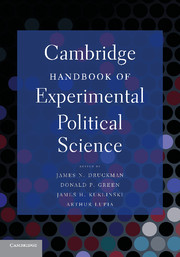Book contents
- Frontmatter
- Contents
- List of Tables
- List of Figures
- Contributors
- Acknowledgments
- INTRODUCTION
- PART I DESIGNING EXPERIMENTS
- PART II THE DEVELOPMENT OF EXPERIMENTS IN POLITICAL SCIENCE
- PART III DECISION MAKING
- PART IV VOTE CHOICE, CANDIDATE EVALUATIONS, AND TURNOUT
- PART V INTERPERSONAL RELATIONS
- PART VI IDENTITY, ETHNICITY, AND POLITICS
- PART VII INSTITUTIONS AND BEHAVIOR
- PART VIII ELITE BARGAINING
- PART IX ADVANCED EXPERIMENTAL METHODS
- AFTERWORD
- 36 Campbell's Ghost
- Name Index
- Subject Index
- References
36 - Campbell's Ghost
Published online by Cambridge University Press: 05 June 2012
- Frontmatter
- Contents
- List of Tables
- List of Figures
- Contributors
- Acknowledgments
- INTRODUCTION
- PART I DESIGNING EXPERIMENTS
- PART II THE DEVELOPMENT OF EXPERIMENTS IN POLITICAL SCIENCE
- PART III DECISION MAKING
- PART IV VOTE CHOICE, CANDIDATE EVALUATIONS, AND TURNOUT
- PART V INTERPERSONAL RELATIONS
- PART VI IDENTITY, ETHNICITY, AND POLITICS
- PART VII INSTITUTIONS AND BEHAVIOR
- PART VIII ELITE BARGAINING
- PART IX ADVANCED EXPERIMENTAL METHODS
- AFTERWORD
- 36 Campbell's Ghost
- Name Index
- Subject Index
- References
Summary
Congratulations, intrepid reader! You have come a long way. After thirty-five chapters, many hundreds of pages of text, and cascades of footnotes, what more is there to say on the subject? Exactly. My remarks are thus brief.
The conference that led to this volume began with remarks by Jamie Druckman, who reminded us how right and proper it was that Northwestern University host our gathering. Northwestern was Donald Campbell's home for more than three decades, and no one was more important than Campbell in bringing the philosophy, logic, and practice of experimental methods to the social sciences. In graduate school, I was trained in experimental methods by Barry Collins, a student of Campbell's. For more than thirty years, first at Yale and later at Michigan, I have been teaching a graduate seminar on research design that draws heavily on Campbell's work. Those who survived this experience have taught similar courses elsewhere. Alterations and additions there have been along the way, of course, but the core ideas and the heart of the syllabus go back to Campbell. Throughout the conference, Campbell was never far from my mind, and he is back again now.
This is presumptuous of me to say, but I am going to go ahead and say it anyway: I believe that Campbell would have been thrilled with both the conference proceedings and the handbook that you are doing your best to keep balanced in your hands.
- Type
- Chapter
- Information
- Cambridge Handbook of Experimental Political Science , pp. 525 - 530Publisher: Cambridge University PressPrint publication year: 2011



